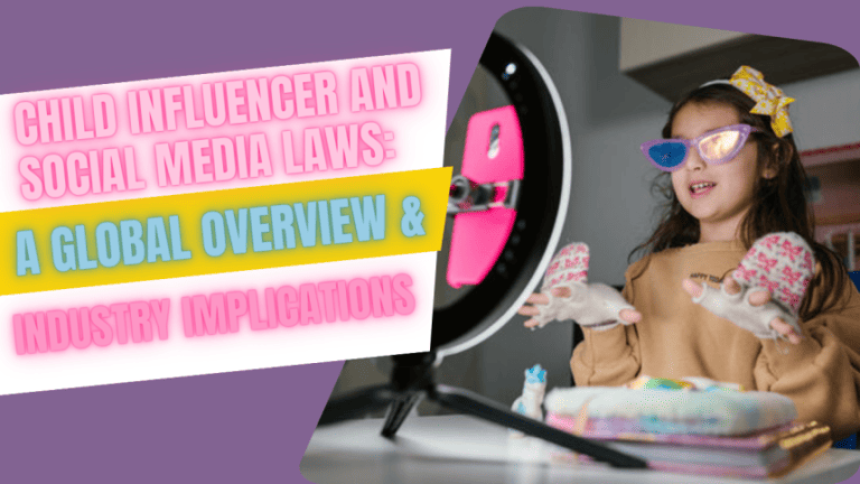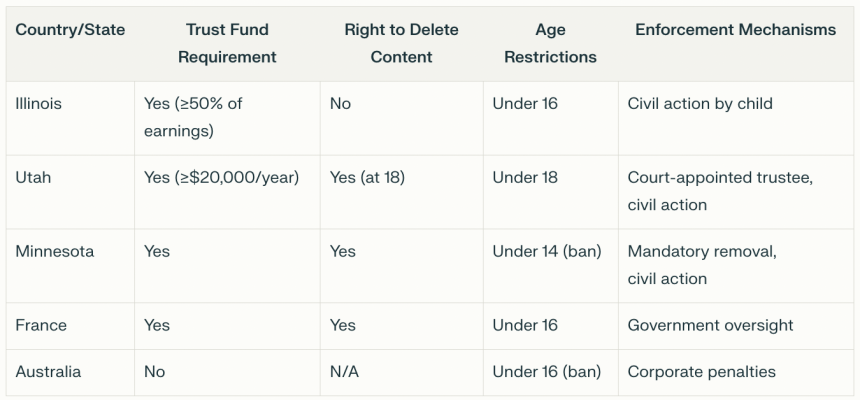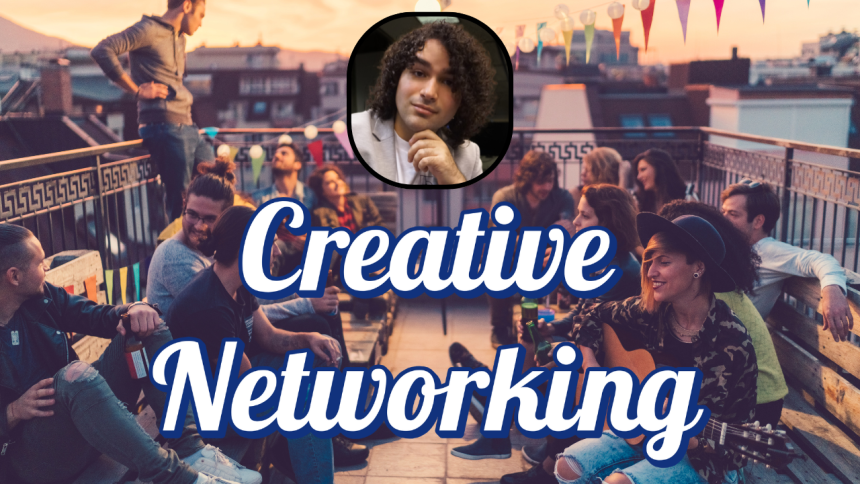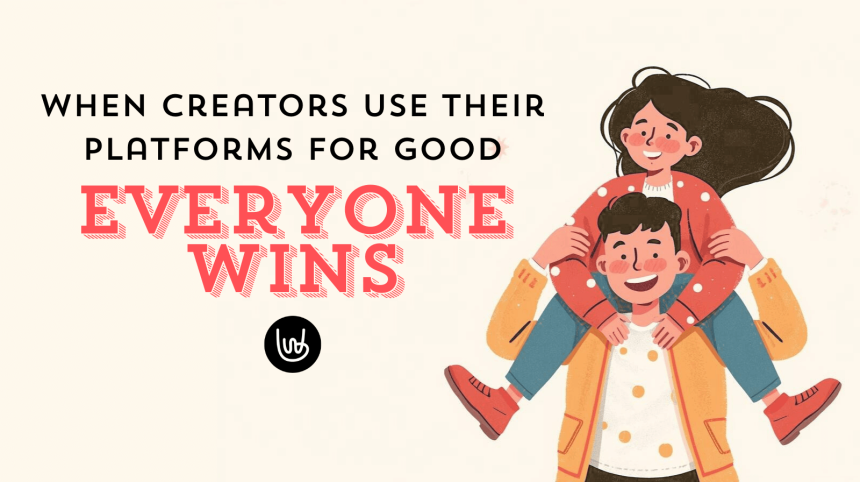
Child Influencer and Social Media Laws
A Global Overview and Industry Implications
Creativity comes at any age. In a world where children have access to technology practically from birth its not surprising some would want to try their hands at it from a young age. Unfortunately, when the creations of children can be monetized, this leaves an opportunity for them to be taken advantage of. Situations such as the recent controversy in Illinois have put a spotlight on this issue. The rise of child influencers- minors featured in monetized social media content- has prompted a wave of new legislation worldwide. These laws aim to protect children from exploitation, ensure fair compensation, and grant them greater control over their digital identities. Below is a summary of the latest legal developments, their significance for creators, and what they mean for the future of the industry.
Recent Legislative Updates
United States
- Illinois: The first state to pass a dedicated child influencer law, effective July 1, 2024. If a child under 16 appears in at least 30% of a parent’s monetized content within a month, parents must set aside a portion of earnings (at least 50%) in a trust accessible when the child turns 18. Children can sue for unpaid compensation.
- Utah: Effective May 2025, requires trust funds for children earning $20,000 or more annually from social media. The law also allows young adults to request deletion or editing of content they appeared in as minors, and mandates court-appointed trustees for large trusts to prevent parental misuse.
- Minnesota: Starting July 2025, prohibits children under 14 from content creation work and requires removal of content at a minor’s request. Trust funds are also mandated.
- Other States: At least eight more states are considering similar bills.
France
- Requires parents to declare child influencer activities to authorities, document working hours and earnings, and deposit a portion of income into a secure account for the child. Children can demand the permanent removal of their images from platforms.
Australia
- Has approved one of the world’s strictest bans, prohibiting children under 16 from accessing social media. Enforcement pilots begin in 2025, with major penalties for non-compliance by tech companies. However, financial compensation for child influencers is not guaranteed.
United Kingdom and European Union
- The UK’s Online Safety Act (2023) introduces stricter platform requirements and age restrictions, with ongoing reviews to address children’s online safety. The EU is considering further regulation, particularly around privacy and data protection for minors.
Key Provisions in Child Influencer Laws


Why These Laws Matter
Financial Protection:
Historically, child performers in film and television have been protected by “Coogan Laws,” requiring earnings to be set aside in trust. Until recently, no such protections existed for children in influencer content, leaving many vulnerable to financial exploitation by parents or guardians. New laws close this gap, ensuring children receive a fair share of the profits generated from their likeness and labor.
Privacy and Autonomy:
Many laws now grant children the right to request the deletion or editing of content they appeared in as minors, giving them agency over their digital footprint as they reach adulthood.
Workplace Protections:
Regulations in France and Minnesota require parental disclosure of working hours and conditions, mirroring child labor protections in traditional entertainment. This aims to prevent overwork and ensure children’s participation is voluntary and safe.
Legal Recourse:
Empowering children to sue for unpaid compensation or privacy violations provides a strong deterrent against parental misuse and sets a precedent for accountability.
Global Trends and Future Implications
Expansion of Protections:
With several U.S. states and countries like France and Australia leading the way, more jurisdictions are expected to adopt similar laws. The trend is toward harmonizing digital child labor protections with those in traditional media, and extending privacy rights to minors.
Industry Impact:
Content creators and agencies must adapt to new compliance requirements, maintaining records, establishing trusts, and responding to content removal requests. Non-compliance can result in legal action, reputational harm, and financial penalties.
Platform Responsibility:
There is growing pressure on social media companies to enforce these laws, including age verification, content moderation, and facilitating deletion requests. Future reforms may require platforms to play a more active role in protecting minors.
Children’s Rights in the Digital Age:
These developments reflect a broader societal shift toward recognizing children’s rights online-balancing commercial interests with the best interests of the child, as emphasized in the UN Convention on the Rights of the Child.
“The enactment of this law marks a pivotal moment for the extensive family vlogging sector, where parental influencers profit from showcasing their children on social media. Critics argue that children lack the capacity to provide meaningful consent for their online presence and condemn parents who capitalize on their images.”5

Conclusion
Child influencer and social media laws are rapidly evolving, setting new standards for the protection of minors in the digital economy. These laws are crucial not only for safeguarding children’s earnings and privacy but also for shaping a more ethical and sustainable future for the creator industry. As more regions adopt such protections, creators, platforms, and families must stay informed and compliant-or risk legal and societal backlash.
I for one am glad we are taking steps to protect our youngest creators so they can continue to develop their own style while still getting to enjoy being children
---Articles Referenced in this Blog---
https://lsj.com.au/articles/a-grey-zone-regulations-on-the-rights-of-child-influencers/
https://www.rollingstone.com/culture/culture-news/illinois-child-influencer-law-1235053914/
https://www.romanolaw.com/utah-passes-landmark-law-to-protect-child-influencers/
https://thespringgroup.org/articles/recommendations-to-combat-child-exploitation-in-social-media
About the Author
Nikki Lopez is a seasoned professional with over a decade of experience in the startup world, specializing in leveraging creative content and community building to empower content creators. Known for a strategic approach and a deep understanding of audience needs, Nikki has a proven track record of leading the development of engaging content strategies and guiding the growth of thriving communities. Her leadership focuses on fostering meaningful interactions and impactful journeys for both creators and their audiences.





